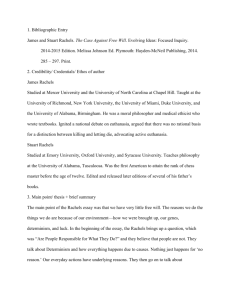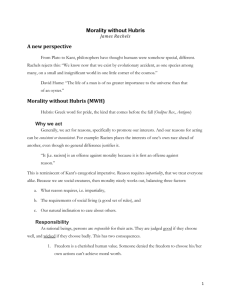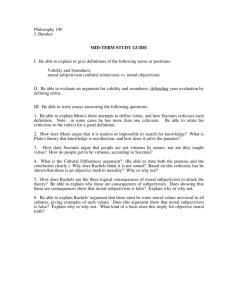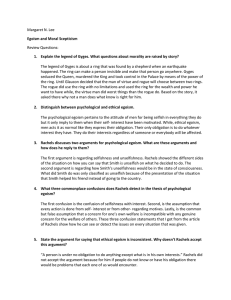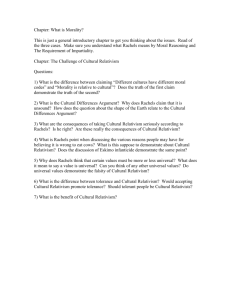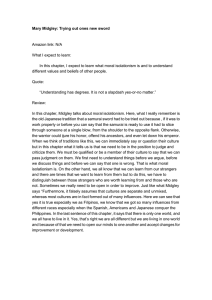LOGOS “From a Logical Point of View”
advertisement
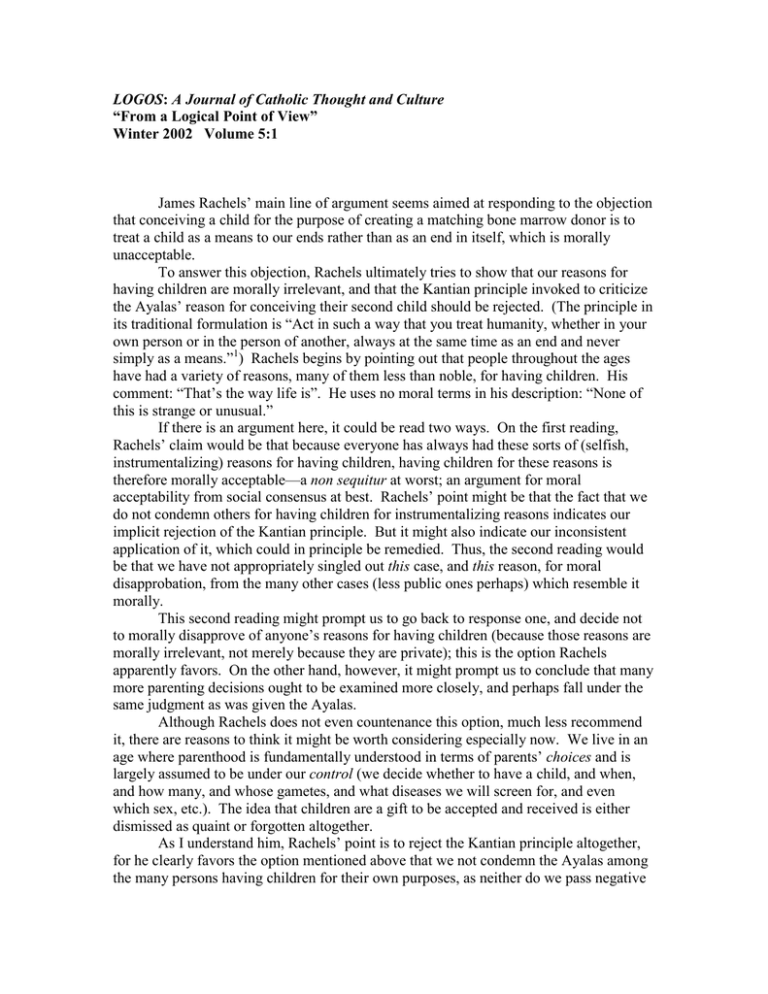
LOGOS: A Journal of Catholic Thought and Culture “From a Logical Point of View” Winter 2002 Volume 5:1 James Rachels’ main line of argument seems aimed at responding to the objection that conceiving a child for the purpose of creating a matching bone marrow donor is to treat a child as a means to our ends rather than as an end in itself, which is morally unacceptable. To answer this objection, Rachels ultimately tries to show that our reasons for having children are morally irrelevant, and that the Kantian principle invoked to criticize the Ayalas’ reason for conceiving their second child should be rejected. (The principle in its traditional formulation is “Act in such a way that you treat humanity, whether in your own person or in the person of another, always at the same time as an end and never simply as a means.”1) Rachels begins by pointing out that people throughout the ages have had a variety of reasons, many of them less than noble, for having children. His comment: “That’s the way life is”. He uses no moral terms in his description: “None of this is strange or unusual.” If there is an argument here, it could be read two ways. On the first reading, Rachels’ claim would be that because everyone has always had these sorts of (selfish, instrumentalizing) reasons for having children, having children for these reasons is therefore morally acceptable—a non sequitur at worst; an argument for moral acceptability from social consensus at best. Rachels’ point might be that the fact that we do not condemn others for having children for instrumentalizing reasons indicates our implicit rejection of the Kantian principle. But it might also indicate our inconsistent application of it, which could in principle be remedied. Thus, the second reading would be that we have not appropriately singled out this case, and this reason, for moral disapprobation, from the many other cases (less public ones perhaps) which resemble it morally. This second reading might prompt us to go back to response one, and decide not to morally disapprove of anyone’s reasons for having children (because those reasons are morally irrelevant, not merely because they are private); this is the option Rachels apparently favors. On the other hand, however, it might prompt us to conclude that many more parenting decisions ought to be examined more closely, and perhaps fall under the same judgment as was given the Ayalas. Although Rachels does not even countenance this option, much less recommend it, there are reasons to think it might be worth considering especially now. We live in an age where parenthood is fundamentally understood in terms of parents’ choices and is largely assumed to be under our control (we decide whether to have a child, and when, and how many, and whose gametes, and what diseases we will screen for, and even which sex, etc.). The idea that children are a gift to be accepted and received is either dismissed as quaint or forgotten altogether. As I understand him, Rachels’ point is to reject the Kantian principle altogether, for he clearly favors the option mentioned above that we not condemn the Ayalas among the many persons having children for their own purposes, as neither do we pass negative judgments on the others. The difficulty is that he does not give any reason to reject the principle other than pointing out that most people frequently ignore it in practice (or at best inconsistently apply it). But it does not follow from the fact that many people do not obey a rule that the rule is specious or ought not to be a rule (consider how frequently people lie, for example). In fact, using our current practices as the criterion of the acceptability of moral principles seems like a good way to eliminate morality altogether! But his more fundamental point, I think, is not so much that we are using the wrong moral principle to judge our reasons for having children, but that we should not be judging our reasons for having children at all. This becomes clear when we consider that both of his key rhetorical questions at the end of the selection are meant to sufficiently cover the ‘real ethical issues’ at stake and that both ignore completely the reason for having the child in the first place. The first case asks us to consider two scenarios—one in which we have one child who dies young, another in which we have two children who live full lives. Naturally, we prefer the second scenario. But any intentional or causal link between deciding to have the first and deciding to have the second—i.e., that the second child is conceived in order to prevent the first child’s death—is missing from Rachels’ description. Thus the difference between Rachels’ scenario and the Ayalas’ case is that Rachels’ scenario simply omits the controversial moral issue at hand by eliminating that feature of the case and then evaluating the outcomes in an intentional vacuum. The second scenario asks us to consider the use of stem cells from a baby already born. Again, as the baby here is already born, the reasons for conceiving the child (the intention to create a suitable donor) are safely in the past and not a part of the relevant ethical issues before us.2 By setting up scenarios in which a moral issue does not arise and then claiming that there is no moral problem, Rachels’ strategy seems to be to define the issue out of existence, rather than to give us reasons why it is not a moral problem, for he does not give us any argument that intentions and purposes are morally irrelevant. Rachels’ case rests on the truth of his claim that our reasons for having children (as means to our own ends, or as ends in themselves, or some mixture of the two) are really morally irrelevant as long as the children are loved and nurtured once they are born. But are these two issues so neatly separable? It is not immediately obvious to me that having children for reasons which instrumentalize them has no ill effect on our ability to love and welcome them in the right way once they are born. To address this point, let me offer a hypothetical case, one like the Ayalas except that it involves pre-implantation genetic diagnosis (PGD). In such a case, eggs (usually 8-10) would be harvested from the mother, fertilized by the father’s sperm, and then tested for donor compatibility. Lastly, several compatible embryos would be implanted and the incompatible ones discarded or used for research. The point of pre-implantation genetic diagnosis is to find a match, for the parents accept and choose to implant only the matching embryos. (In this case, a match would be produced for the parents in the laboratory.) In this hypothetical case, the parents’ conditional acceptance of the child is clear enough. In the Ayalas case, the matching donor is not manufactured but procreated, and yet the intention and point of the enterprise—to procure a match—is, I think, largely the same.3 The problem (if there is one) with both of their intentions, however, can be seen in the reaction of the parents if their intentions or purposes are frustrated. What if the child who implants (in the PGD case) is misdiagnosed as a match? Can parents simultaneously sue the lab and welcome the child? Rachels’ main ethical criterion is that the child is loved and accepted once born. But in the PGD case precisely our purposes for that child, our reasons for having it— namely, that it be a match—serve to make our acceptance and love for it conditional. What do we do with a child who has been made for a purpose but who cannot or does not fulfill that purpose? What is the value of that child? In the happy case, the child is loved and accepted anyway, i.e., despite his or her failure to be what we intended. In the unhappy case, it is fit for disposal, either at the embryonic stage or a later one. My question is whether something similar might have happened in the Ayalas case, given the similarity of intentions. Their case had a happy ending, as it turned out, but might not have. What if the baby conceived had not been a donor match?4 Would the parents regret who the child is, or regret having it? Rachels might reply that many parents have regrets about who their children are or who they become. But there is a difference between children who are not what we expected and children who are not what we intended. The difference is the degree of control we understand ourselves as having over them and to what extent they (and their value) are subject to our own projects and intentions. If having a child in order to further our own purposes indeed damages our ability to love and accept them unconditionally, as in the PGD case, and if the Ayalas’ case is analogous in the relevant respects, then Rachels must admit that loving and accepting children once they are born in turn requires some moral evaluation of our reasons for having them, an evaluation that at the very least rules out reasons that treat others solely as instruments useful for our own purposes. The Kantian principle is morally relevant if we are to love our children differently than we love our cars. And that difference is something that neither Rachels nor I want to give up. It is precisely a relationship of love and acceptance that requires a person, and not an instrument subject to our intentions, as its recipient and reciprocator. Rebecca Konyndyk DeYoung Department of Philosophy Calvin College End Notes 1 Grounding for the Metaphysics of Morals, Ak. 429 (trans. Ellington). Since the nature of the position he takes himself to be responding to should be clear, I want to make two points about the formulation given in this selection. The formulation he quotes and uses reads: “Each person is an end in himself or herself, and is never to be used solely as a means to another person’s ends without the agreement of the person being used.” First, like Kant’s formulation, respecting other persons as ends in themselves means never using them solely as a means to another’s ends. Clearly, other people are useful for our ends: e.g. my research assistant, teammates, etc. help me achieve many of my goals and purposes. The point is that the other person is still treated as a person—respected for who he or she is in his or her own right, as having ends of her own and a reason and will of her own, and not merely as an instrument of my will. Losing sight of this distinction--between i) being useful but still an end in itself and ii) being used solely as a means--might lead us unnecessarily to reject the principle altogether as impossible to follow. Whether this is behind Rachels’ rejection of the principle is not clear from this short passage. Secondly, Rachels’ accepts (in his second rhetorical question) the ‘consent clause’ as part of the principle. Thus formulated, the principle says that it is morally licit to use another person solely as a means to my ends if that person has agreed to be so used. But this undermines the whole point of the traditional Kantian formulation. On the Kantian formulation, irrespective of their consent, persons are the sort of thing that ought not to be treated merely as means, because they are (whether they realize or respect the fact) ends in themselves. (Perhaps the ethicist Rachels quotes understands giving consent as an exercise of autonomy consonant with one being an end in itself, but as I see it, the consent would then be a practical self-contradiction, an act of which uses one’s autonomy to undermine one’s autonomy.) The trouble with the formulation Rachels responds to is that it could morally justify all sorts of activities which instrumentalize persons with their apparent consent, including all manner of exploitation (although difficulties immediately arise, as in medical ethics, about what truly constitutes ‘consent’). 2 There are still instrumentalization issues that might arise (as with any case of donation), but the key controversial moral issue with the Ayalas case again drops out. 3 The largest difference between their case and our hypothetical one thus lies in the moral status of the means (another area of great moral controversy), but the willingness to use one means or another also might reflect back on differences in intention (i.e., how far are you willing to go to procure and guarantee a donor match?). In this respect, the Ayalas decision is on higher moral ground than a case of PGD. 4 Again, that they were willing to risk this, rather than ‘guarantee’ it, as in the PGD case says something in greatly in favor of their intentions, I think, unless their choice was only a reflection of the means available to them.
